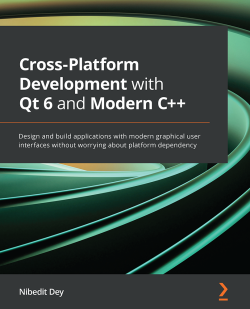I recently received a review copy of the Cross-Platform Development with Qt 6 and Modern C++ by Nibedit Dey available from Packt. I find it interesting to read books on Qt in the midst of a major version shift, as many of the underpinnings of Qt are revisited and updated by the development teams.
In his book, Nibedit balances between the newer technologies used, e.g. CMake, function reference based signals and slots, etc while referring back to Qt 5 (and even Qt 4) practices such as QMake, the SIGNAL and SLOT macros, and more. This gives a good context to the reader, which is good for the reader, as older practices still are used in older Qt-based codebases.
The book is divided into blocks with increasing depth and complexity. This makes it a good read for the beginner, as well as the more experienced used of Qt. Either you start from the beginning and get introduced to both widgets and QML, or you can dive straight into the more advanced topics such as the model-view concepts.
What I particularly like about the book is the focus on the cross-platform capabilities of Qt. This is how Qt was started, and something that is often lost these days. Qt is more than a UI toolkit and the real strength is the ability to use a single code base to build native applications for the major desktop (and some not so major) as well as the major mobile platforms. This is a reoccuring theme throughout the book where it starts by installing the Qt development environment on all major platforms, discusses how to setup Qt for mobile development, as well as for how to deploy Qt applications in all these scenarios.
There are other highlights too such as the chapter on testing, discussions on profiling and optimizations, and other topics not commonly found in this type of book.
What could be said to be missing is any content on embedded device development, 3D tooling and classes, the design focused tooling, and more. But Qt is such a broad topic these days that it would be impossible to cover it all in a single book.
All in all, this is a recommended read!

Thanks, I’ll give this one a try